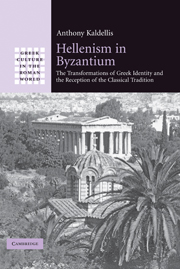 Hellenism in Byzantium
Hellenism in Byzantium Book contents
- Frontmatter
- Contents
- Preface
- Introduction
- PART I GREEKS, ROMANS, AND CHRISTIANS IN LATE ANTIQUITY
- 1 “We too are Greeks!”: the legacies of Hellenism
- 2 “The world a city”: Romans of the East
- 3 “Nibbling on Greek learning”: the Christian predicament
- Interlude: Hellenism in limbo: the middle years (400–1040)
- PART II HELLENIC REVIVALS IN BYZANTIUM
- General conclusions
- Bibliography
- Index
Interlude: Hellenism in limbo: the middle years (400–1040)
Published online by Cambridge University Press: 24 December 2009
- Frontmatter
- Contents
- Preface
- Introduction
- PART I GREEKS, ROMANS, AND CHRISTIANS IN LATE ANTIQUITY
- 1 “We too are Greeks!”: the legacies of Hellenism
- 2 “The world a city”: Romans of the East
- 3 “Nibbling on Greek learning”: the Christian predicament
- Interlude: Hellenism in limbo: the middle years (400–1040)
- PART II HELLENIC REVIVALS IN BYZANTIUM
- General conclusions
- Bibliography
- Index
Summary
Between Synesios and Psellos, so for a period of six centuries, Hellenic identity went into abeyance. It had only a hypothetical existence, being a relic of the past that could be glimpsed in ancient texts; or the antithesis of Christianity, something that could both negate and complement but whose power was never actualized; or fragmented markers that signified little, for example the mere fact of language or geography. Not all of its elements even survived the end of antiquity. Having described the storms of late antiquity, it is useful to take stock of Hellenism and see what was jettisoned, what retained, and what washed up on the shores of Byzantium, to be salvaged in later times. The religions of the ancient Greeks, for example, were more or less ended by the end of antiquity. Some of their elements were absorbed into Christianity, but not in a way that threatened or could spark a revival. It was not until the very end of Byzantium, with Georgios Gemistos Plethon, that a revival was even imagined, and it too led nowhere. The end of paganism entailed the obsolescence of certain ancient centers of Greek identity, chiefly Delphi and Olympia. During the early Roman empire, when Hellenism spread throughout the East, those places had served to draw attention to the Greek homeland. Now a de-Hellenized Greece found itself with hardly any Christian credentials and no imperial capital.
- Type
- Chapter
- Information
- Hellenism in ByzantiumThe Transformations of Greek Identity and the Reception of the Classical Tradition, pp. 173 - 188Publisher: Cambridge University PressPrint publication year: 2008
